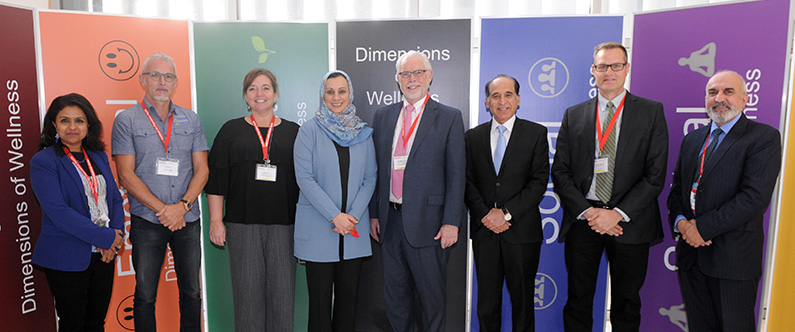Experts discuss student wellness at WCM-Q symposium
 Dr. Sohaila Cheema, Dr. Arthur Hengerer and Dr. Ravinder Mamtani (center), with speakers at the symposium.
Dr. Sohaila Cheema, Dr. Arthur Hengerer and Dr. Ravinder Mamtani (center), with speakers at the symposium.
More than 100 healthcare and education professionals convened at WCM-Q for a two-day symposium on protecting student wellness.
The symposium, coordinated by WCM-Q’s Institute for Population Health and the Division of Student Affairs, featured a series of interactive workshops and presentations delivered by experts in their fields on topics such as stress management, mental wellness and physical resilience, time management, healthy diets, physical exercise and more.
Dr. Ravinder Mamtani, senior associate dean for population health, capacity building and student affairs, said: “College can be a very challenging environment for students, what with the stress of their studies and living away from home for the first time. It is therefore extremely important that as healthcare and educational professionals we understand how to promote and protect wellness on campus so that students are happy, healthy and able to get the best out of their time at college.”
The first day of the symposium saw workshops by WCM-Q’s Jamie Marie Gray, director of the Distributed eLibrary, and Dr. Sunanda Holmes, assistant professor of healthcare policy and research, on cultivating mental wellness; Dr. Mohamud Verjee, assistant dean for medical student affairs on physical activity; Dr. Mamtani and Dr. Sohaila Cheema, director of the Institute for Population Health, on food shopping, cooking and healthy diets; and Ms. Raji Anand, IPH administration manager, on time management.
The second day featured presentations and lectures on a number of key topics by healthcare and education professionals. These included Dr. Wayne S. Dysinger, CEO and physician at Lifestyle Medicine Solutions, on using lifestyle medicine to promote wellness. Ms. Julie Smith, professor in the School of Communication at Webster University, spoke about the impact of media literacy on student wellness.
Ms. Smith said: “As the media – both social and mainstream - pervade more and more areas of our lives it becomes increasingly important to be critical and knowledgeable consumers of media content. Helping students to understand how, why, by whom and for what purpose content is created gives them an ability to deal with media that might otherwise be alarming.”
Dr. Dysinger commented: “I’m passionate about lifestyle medicine because it can be so beneficial for students. Eating well, taking regular exercise, managing stress and getting enough sleep provide a solid foundation upon which students can build academic success.”
The event was accredited locally by the Qatar Council for Healthcare Practitioners-Accreditation Department (QCHP-AD) and internationally by the Accreditation Council for Continuing Medical Education (ACCME).
Other presentations included those by Dr. Arthur Hengerer, professor of otolaryngology at the University of Rochester, on the importance of wellbeing for achieving academic and personal goals, and Stephan Herzog, executive director, American Board of Lifestyle Medicine who spoke on busting common nutrition myths. As the event drew to a close, Dr. Cheema moderated a panel discussion and Q&A session in which delegates explored topics and ideas arising from the discussions at the symposium, before Dr. Verjee gave the concluding remarks.
Dr. Cheema said: “We are very grateful to all of our expert speakers for bringing their knowledge to the symposium to share with everyone. Providing students with support is crucial, but the event also underlined the need to equip students with appropriate skills, knowledge and resilience to rise to the challenges they may face as they progress in their respective careers.”